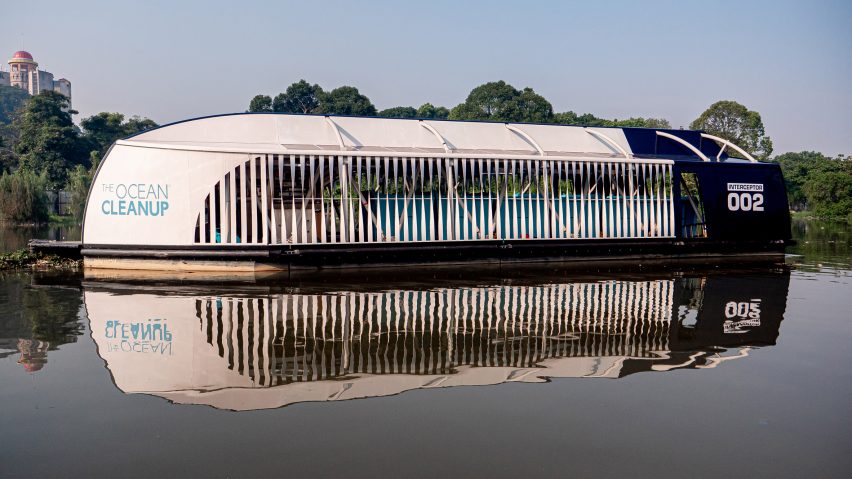Dutch non-profit The Ocean Cleanup has launched the Interceptor, an autonomous system for collecting plastic pollution from rivers before it reaches the sea.
The organisation said the solar-powered system would augment its ongoing efforts to remove marine plastic waste from the oceans.
"To truly rid the oceans of plastic, we need to both clean up the legacy and close the tap, preventing more plastic from reaching the oceans in the first place," said The Ocean Cleanup founder Boyan Slat.
"Combining our ocean cleanup technology with the Interceptor, the solutions now exist to address both sides of the equation."
Interceptors consist of floating barriers attached to processing plants that resemble barges and are anchored to the river bed. The barriers funnel plastic waste into the mouth of the plant, which is powered by solar panels and operates without the need for human operators.
A conveyor belt separates the waste from the water and moves it up to a shuttle, which automatically dumps the waste into containers on a separate barge docked below.
When the containers are all full, the onboard computer system alerts local partners to bring a boat and tow the barge of plastic waste away for recycling. Each system only spans part of the river, so boats and wildlife can manoeuvre around it.
According to the The Ocean Cleanup, each Interceptor can extract 50,000 kilograms of trash from a river each day, going up to 100,000 kilograms "under optimised conditions".
The Ocean Cleanup aims to install Interceptors in 1,000 of the world's most polluted rivers within five years.
According to their research, which includes an interactive map, 80 per cent of the rubbish in the oceans come from just 1 per cent of the world's rivers.
Two Interceptor systems are already operational in Klang, Malaysia, and Jakarta, Indonesia. A third Interceptor will soon be deployed in the Mekong Delta in Vietnam, while a fourth is bound for Santo Domingo in the Dominican Republic.
Thailand has signed up to get an Interceptor stationed near Bangkok, and The Ocean Cleanup said that it is in talks to have one deployed in LA County in the USA.
The device's solar panels charge lithium-ion batteries, which allow the plant to run 24 hours a day, seven days a week, without noise or fumes.
The Ocean Cleanup developed the river systems to compliment its original mission to clear the world's seas of plastic pollution.
System 001, nicknamed Wilson, is a floating rig designed to collect plastic from the Great Pacific Garbage Patch. It has suffered several major setbacks, including a fracture in January 2019 that required it to be towed to Hawaii for repairs.
The improved System 001/B has been able to collect some plastic, including pieces as small as one millimetre, The Ocean Cleanup team announced in October. Plastic caught by the rig will be recycled or burnt to generate electricity.
Critics of the project have raised concerns that the system, which received $30 million (£23 million) in funding, is not a viable solution for ridding the oceans of plastic.
Cyrill Gutsch, founder of Parley for the Oceans, has warned that cleaning up all the plastic already in the sea may be an impossible task.
Gutsch, whose organisation has trademarked the term Ocean Plastic to highlight marine pollution, told Dezeen that the focus should be on creating alternatives to plastic.
"I just think we will not get plastic under control," he said. "And I don't want to be creating the wrong illusion that we are able to clean up the ocean, because I don't think we are."
Many experts think that preventing plastic waste from getting into the ocean in the first place is a better strategy than trying to remove it once it has got there. Recycling expert Arthur Huang told Dezeen earlier this year that collecting plastic from polluted rivers "will have way more impact and collect way more ocean trash."

